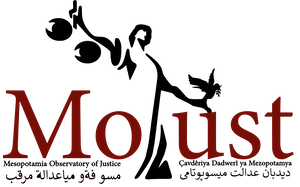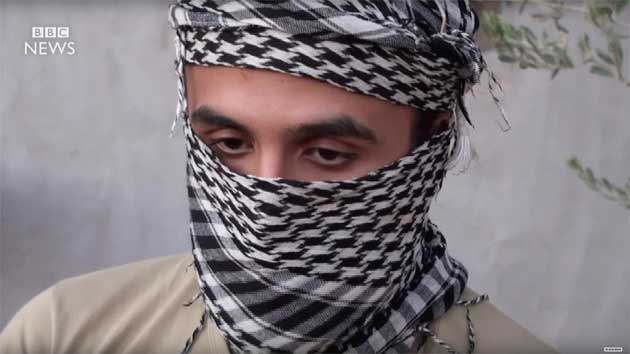Mojust welcomes the conviction of Dutch-born Oussama Achraf Akhlafa in the first Da’esh/ISIS war crimes prosecution in the Netherlands. On Tuesday, the court convicted Mr Akhlafa of membership of a terrorist organisation, violating the personal dignity of victims of war in Syria and preparing terrorist attacks, and sentenced him to 7 years and 6 months in prison. The court’s judgment demonstrates the use of universal jurisdiction to prevent impunity for Da’esh/ISIS fighters. The judgment also highlights, however, the inadequacy of home-state prosecutions, based on social media postings, to provide justice for the international crimes committed by Da’esh/ISIS in Syria and Iraq.
The case against him
Prosecutors presented evidence that Mr Akhlafa travelled from the Netherlands to join Da’esh/ISIS fighters in Mosul and Raqqa between 2014 and 2016. They submitted a photo of him posing beside the body of a man crucified on a wooden cross, and Facebook posts in which he shared images of a Da’esh/ISIS fighter holding the head of a dead Kurdish fighter and of someone standing on the body of a dead woman. The image of the crucified man was matched to a film of the execution of an Iraqi man, and Dutch police used geolocation technology to place the execution in the Syrian border-town of Abu Kamal. Prosecutors were also able to present documentary evidence of Mr Akhlafa’s membership of Da’esh/ISIS. His name was on a payroll of Da’esh/ISIS fighters seized during a military operation in June 2017, recording that he fought for three months in a sniper unit in Mosul.
In a statement before the judges on 8 July 2019, Mr Akhlafa claimed he had joined a Da’esh/ISIS medical unit and denied participation in fighting or killings. He claimed to have been forced to pose for the photograph and dismissed comments he made in online chats, such as “Sniping is the funnest thing there is, but highly dangerous”, as mere efforts to impress women. It appears Mr Akhlafa left Da’esh/ISIS in September 2016 and joined the Free Syrian Army before being arrested by Turkish forces in November 2016. Despite being convicted of membership of a terrorist organisation on 17 May 2018, and sentenced to more than 6 years and 3 months’ imprisonment, he was released the same day and made his way to The Netherlands. He stated before the court: “I am being portrayed as a terrorist, madame, but I returned voluntarily and I want to do good.”
The Court’s Findings
The court dismissed Mr Akhlafa’s claims of medical, non-violent service in the ranks of Da’esh/ISIS, being evidently unconvinced with his various “playing the tough guy” explanations and claims of duress in posing for the photograph. The war crimes prosecution followed from the court’s finding that the conflict between the Syrian regime and Da’esh/ISIS was a ‘non-international armed conflict’ under the 1949 Geneva Conventions. The prosecution was founded on Common Article 3 to the Geneva Conventions, which identifies four types of acts which are “prohibited at any time and in any place whatsoever” during conflicts: (1) murder, mutilation and cruel treatment or torture; (2) the taking of hostages; (3) outrages upon personal dignity; (4) convictions and executions in the absence of judicial guarantees. Common Article 3 has a special status in public international law and has been described by the International Court of Justice as enshrining “elemental considerations of humanity” (see here, para 218).
The court ruled that the photo of Mr Akhlafa “actively posing” and “smiling broadly” by the body of a deceased victim of Da’esh/ISIS engaged Common Article 3 as an outrage upon personal dignity. He had thereby humiliated and dishonoured a victim of war by presenting his body as “a trophy”. The court acquitted him of charges relating to the other two images. It convicted a second defendant, 24 year-old Dutch national Reda Nidalha, of membership of a terrorist organisation but acquitted him of charges of recruiting for Da’esh/ISIS on Facebook.
Prosecuting Da’esh/ISIS: The Bigger Picture
The Dutch proceedings were possible using ‘universal jurisdiction’, according to which international crimes can be prosecuted by national courts regardless of where they were committed, in the name of a collective interest in the prevention of impunity (see here). The Dutch War Crimes Unit (‘Team International Crimes’), one of the first in Europe, is actively preparing other cases involving international crimes committed in Syria (see here). It is not alone in turning to universal jurisdiction to prosecute citizen Da’esh/ISIS fighters, an undertaking that requires appropriate domestic legal frameworks, overcoming evidential and other structural challenges (see here). In a situation featuring the participation of up to 53,000 foreign fighters in Syria alone, including more than 13,000 women and children and 8,200 returnees (see here), and a reluctance of European states to permit repatriations, local and individualised prosecutions are manifestly incapable of addressing the demands for justice for the victims of Da’esh/ISIS.
With action at the International Criminal Court blocked by United Nations Security Council vetoes, efforts to ensure international accountability are currently focused on the collection and analysis of evidence of crimes in Syria (see here) and Iraq (see here). Alex Whiting, Professor of Practice at Harvard Law School, has described the Syrian investigation mechanism as “a bridge to a future moment when the conditions and political will exist to provide for accountability” (see here).
The nature and scale of the crimes committed by Da’esh, including the genocide against the Yazidis, shock the conscience of humanity, generating a collective interest in their effective prosecution (see here). Prosecutions such as that of Mr Akhlafa are not enough. An international tribunal is required to respond to the complex demands of ensuring accountability and delivering justice to victims and survivors. MoJust supports the calls of the Kurdish administration in Syria (see here) and the Swedish government (see here) for an International Criminal Tribunal for the Prosecution of International Crimes Committted by Da’esh/ISIL in Iraq and Syria modelled on the international tribunals for the former Yugoslavia and Rwanda.


